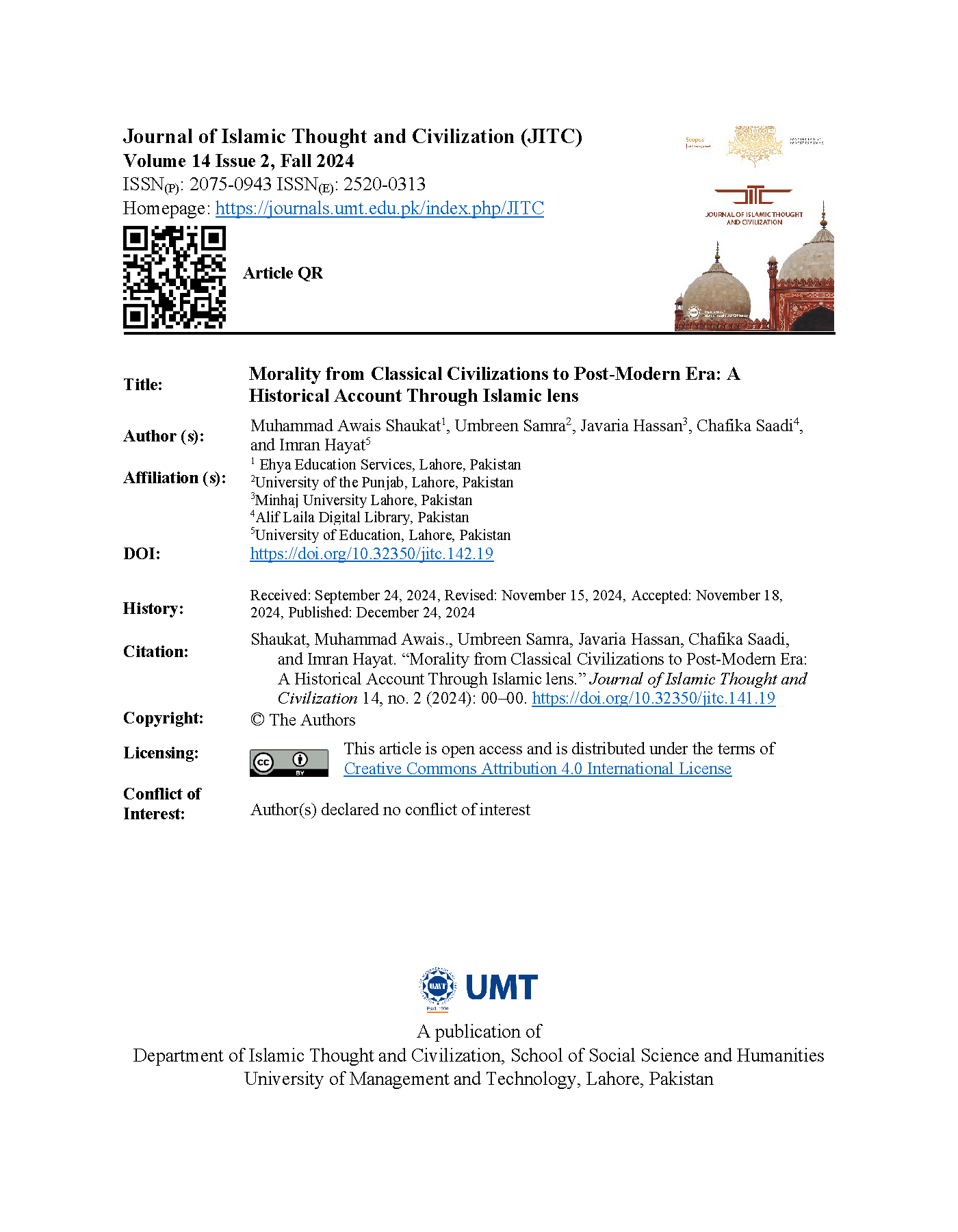Morality from Classical Civilizations to Post-Modern Era: A Historical Account Through Islamic Lens
Abstract
 Abstract Views: 0
Abstract Views: 0
The article provides a comprehensive exploration of the evolution of moral values across various civilizations. It begins by defining morality as a complex system of beliefs and ethical standards that shape human behavior and differentiate between right and wrong. The article then traces the historical perspectives on morality, starting from early classical civilizations like the Greeks and Hindus, to the influence of Semitic religions, particularly Islam, on the development of a coherent moral code. The central thesis revolves around how the perception of morality has shifted significantly over time, from a divine and transcendental pursuit in traditional civilizations to a secular, subjective notion in the modern Western world. The article highlights how traditional systems viewed morality as a pathway to achieving inner peace and cosmic harmony, while the Semitic religions, especially Islam, emphasize the divine command theory, where moral values are absolute, eternal, and rooted in the Qur’an and the Sunnah of the Prophet Muhammad (PBUH). In contrast, modern Western thought, emerging after the Renaissance, places the individual at the center of morality, favoring subjective reasoning over divine guidance. The final sections argue that Islamic morality, unlike other systems, offers a balance between human instincts and divine will, portraying man as inherently good yet capable of moral failures. Islamic teachings provide a comprehensive and timeless framework for human conduct, ensuring both personal and societal harmony. The article concludes that the true understanding of morality lies in adhering to a divinely revealed code, as human nature is susceptible to corruption without the guiding principles set forth by Allah as mentioned in Quran and Hadith.
Downloads
References
Al-Sayyid, Ridwan. “Pluralism and Liberalism in Contemporary Islamic Thought.” In The Challenge of Pluralism. Edinburgh: Edinburgh University Press, 2009.
Ameen, Dr Muhammad. Islam or Tehzeeb Maghrib ki Kashmaksh [The Conflict of Islamic and Western Civilization (urdu).] Lahore: Bait ul Hikmat, 2006.
Amir, Ahmad N., Abdi O Shuriye, Ahmad F Ismail, and Muhammad Abduh. “Muhammad Abduh’s Contributions to Modernity.” Asian Journal of Management Sciences and Education 1, no. 1 (2012).
Ansari, Zafar Ishaq., and John L. Esposito. Muslims and the West: Encounter and Dialogue. Islamabad: Islamic Research Institute, 2001.
Aslan, Reza. No God but God: The Origins, Evolution, and Future of Islam. New York: Random House, 2005.
Audi, Robert. Religious Commitment and Secular Reason. Cambridge: Cambridge University Press, 2000.
Augustine, Saint. The Confessions. Translated by Rex Warner. Toronto: Mentor-Omega, 1963.
Awais Shaukat, Muahammad. “Human Nature in Islamic Perspective; A Study of Dr Muhammad Rafi Ud Din.” Un Published, UMT, Lahore, 2016.
Beheshti, S. Philosophical Contemplations in Education. Tehran: Beynolmelal, 2009.
Dewey, John. Human Nature and Conduct. Online Publications: Cosimo Classics, 2007.
Farmahini, M. Postmodernism and Education (2nd ed.). Tehran: Ayizh, 2010.
Gellner, Ernest. Post-Modernism, Reason and Religion. London: Routledge, 1992.
Gibb, Haji Alamsjah Ratu. Modern Trends in Islam. Octagon Books, 1972.
Giddens, Anthony. The Consequences of Modernity. Cambridge, MA: Polity Press, 1991.
Habermas, Jürgen. The Philosophical Discourse of Modernity: Twelve Lectures, trans. Frederick G. Lawrence, Reprint edition. Cambridge, Mass: The MIT Press, 1990.
Kumar, R. A Step-by-Step Guide for Beginners. London: Sage Publications, 2010.
Lyotard, J. F. The Postmodern Condition: A Report on Knowledge, trans. Geoff Bennington, 1st edition (June 21, 1984) Minnesota: University of Minnesota Press, 1984.
Mencken, H. L. Treatise on Right and Wrong. New York City: Knopf Doubleday, 1936.
Nietzsche, F. Beyond Good and Evil. Translated by R. J. Hollingdale. London: Penguin Classics, 2003.
—. Thus Spoke Zarathustra. Translated by Walter Kaufmann. London: Dover Publications, 1999.
Noddings, N. Philosophy of Education. Stanford University: West View Press, 1995.
Ozmen, H. A. and M. S. Crawer. Philosophical Fundamentals of Education. Translated by G. Motaghifar et al., Qom: Imam Khomeini Educational Institute, 2000.
Poorshafei, H. and Arian, N. Postmodernism and its Implications in Religious Education. Istambul: Islam and Educational Researches, 2009.
Rahnama, A. An Introduction on Moral Education. Tehran: Ayizh, 2009.
Ritzer, G. and B. Smart. Handbook of Social Theory. Georgetown: Sage Publication, 2001.
William, Bernard. Ethics and the Limits of Philosophy. London: Routledge, 1985.

Copyright (c) 2024 Muhammad Awais Shaukat, Umbreen Samra, Javaria Hassan, Chafika Saadi, Imran Hayat

This work is licensed under a Creative Commons Attribution 4.0 International License.

This work is licensed under a Creative Commons Attribution 4.0 International License. Authors retain copyright and grant the journal right of first publication with the work simultaneously licensed under a Creative Commons Attribution (CC-BY) 4.0 License that allows others to share the work with an acknowledgement of the work’s authorship and initial publication in this journal.







